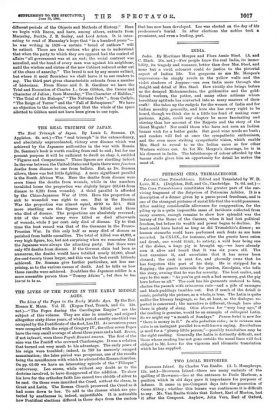ENGLISH HISTORIANS.
English Historians. With an Introduction by A. J. Grant. (Blackie and Son. 2s. 6d.)—Professor Grant gives his readers a criticism of English histories, beginning with the Anglo-Saxon Chronicle. He touches lightly on all the earlier part of the subject, Capgrave being the only monastic chronicler of whom he speaks. He mentions Strype and Burnet, but begins his task proper with the eighteenth century. He describes in some detail the work of Bolingbroke, and then deals at greater length with Hume, Robertson, and Gibbon. We cannot accept all his estimates and conclusions. "Sheer artistic, beauty" is not a quality that we should attribute to the style of Carlyle ; but the Introduction generally is an instructive bit of work. The second and third parts of the volume consist of quotations. First we have "Passages to illustrate the view taken by Historians at different periods of the Objects and Methods of History." Here we begin with Bacon, and have, among others, extracts from Macaulay, Buckle, J. R. Seeley, and Lord Acton. It is inter- esting to read of Macaulay's hope that " in a hundred years"— he was writing in 1828—a certain " breed of authors " will be extinct. These are the writers who give us to understand that when the party to which they are opposed had the control of affairs "all government was at an end ; the social contract was annulled, and the hand of every man was against his neighbour, until the wisdom and virtue of the new Cabinet reduced order out of the chaos of anarchy." The breed is not by any means extinct, but where it most flourishes we shall leave it to our readers to say. The third part gives characteristic extracts from a number of historians. From Hume and S. R. Gardiner we have the Trial and Execution of Charles I.; from Gibbon, the Career and Character of Julian; from Macaulay, " The Character of Halifax," "The Trial of the Bishops," "The National Debt" ; from Carlyle, "The Reign of Terror" and the "Fall of Robespierre." We have no objection to the selection, except that the whole of the space allotted to Gibbon need not have been given to one topic.



























































 Previous page
Previous page